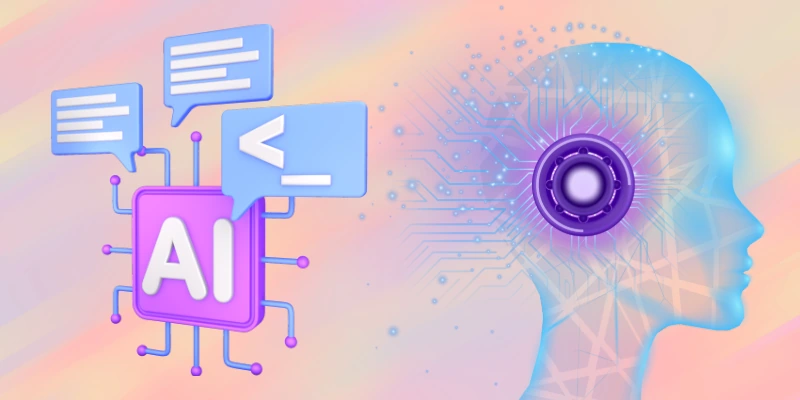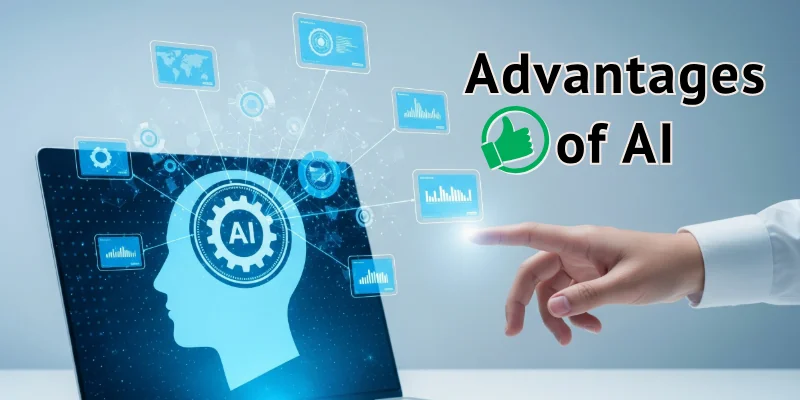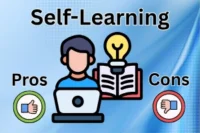Pros and Cons of AI Technology: Benefits vs Limitations
Published: 21 Aug 2025
Artificial Intelligence (AI) is becoming a big part of our daily lives, from voice assistants to self-driving cars. Many people are curious about the advantages and disadvantages of AI (Artificial Intelligence) because it affects how we work, learn, and live.

While AI brings speed, accuracy, and new opportunities, it also raises concerns about jobs, privacy, and control. In this guide, we will explore both sides to understand how AI can help us and where it may cause challenges.
So, let’s dig in!
Advantages of AI (Artificial Intelligence)
As we all know, there are numerous benefits of AI, and I believe that most people are aware of this technology these days.
So, guys, that’s why I’ve brought a list of all the AI advantages for you to read, so you can get an idea of how powerful AI is and how we can use it in our daily lives.
- Automates Tasks
- Increases Efficiency
- Improves Accuracy
- Reduces Human Error
- Makes Faster Decisions
- Analyzes Large Data Sets
- Provides Personalized Experiences
- 24/7 Availability
- Takes on Risky Tasks
- Boosts Productivity
- Advances Scientific Research
- Offers New Entertainment Forms
- Improves Healthcare
- Optimizes Resource Management
- Develops Innovative Products
- Enhances Creativity
- Connects People Globally
- Predicts Outcomes Accurately
- Virtual Reality
- Fraud Detection

Let’s cover each pros of AI technology.
1. Automates Tasks
AI can easily take over repetitive tasks that humans often find boring or time-consuming. This helps free up our energy for creative and important work. Honestly, I find it super useful when small things like reminders, sorting emails, or scheduling meetings get done automatically. If you haven’t tried it yet, I’d recommend starting with simple AI tools—you’ll notice the relief.
- Saves time in daily tasks
- Handles boring work automatically
- Lets you focus on creativity
2. Increases Efficiency
One of the best things about AI is how quickly it gets things done. It reduces the effort needed and helps achieve results faster. I personally feel it’s a game-changer for productivity—when AI tools speed up tasks, you actually feel less stressed. Try using AI apps for managing projects, and you’ll see how smoothly work flows.
- Speeds up everyday work processes
- Makes goals easier to achieve
- Reduces stress and wasted time
3. Improves Accuracy
AI systems are designed to be precise, which means they make fewer mistakes compared to humans. This is especially important in fields like medicine, finance, or data analysis. From my experience, even small tools like AI grammar checkers save me from errors. I’d suggest giving it a try—you’ll feel more confident in your results.
- Detects small errors humans miss
- Provides reliable and consistent results
- Increases trust in final output
4. Reduces Human Error
AI doesn’t get tired or distracted, which means it makes fewer mistakes than humans. This is super helpful in areas where accuracy is important, like calculations or medical diagnoses. Honestly, I’ve seen how AI spell-check saves me from embarrassing mistakes. My suggestion? Use AI wherever precision really matters.
- Cuts down mistakes at work
- Delivers more reliable results
- Improves confidence in outcomes
5. Makes Faster Decisions
AI can analyze situations quickly and suggest solutions in seconds. This is something we humans often struggle with because we take more time to decide. I’ve personally felt how decision-making tools save hours of thinking. If you often feel stuck choosing, AI apps can guide you faster.
- Analyzes data quickly and smartly
- Helps make better decisions fast
- Saves hours of thinking time
6. Analyzes Large Data Sets
AI can handle massive amounts of data that would take humans weeks or months to process. It finds patterns and insights we might miss. I think it’s amazing how AI tools simplify data into easy charts. If you deal with reports, try AI analytics—you’ll thank yourself.
- Handles big data with ease
- Finds hidden patterns in seconds
- Turns complex info into insights
7. Provides Personalized Experiences
AI makes experiences feel personal, like suggesting shows on Netflix or products on Amazon. I honestly love how it understands my taste better than some friends do. My tip? Use personalized AI apps—they save time and make life more enjoyable.
- Suggests things you may like
- Makes services feel tailor-made
- Improves overall user satisfaction
8. 24/7 Availability
Unlike humans, AI doesn’t need sleep or breaks—it’s always available. This is great for customer support or services that need round-the-clock help. Personally, I find chatbots so useful when I get stuck at midnight. If you run a business, try adding AI support—it’s a lifesaver.
- Works all day without breaks
- Provides instant customer help
- Ensures nonstop business support
9. Takes on Risky Tasks
AI can be used in dangerous places, like handling bombs, exploring space, or working in mines. This reduces the chance of humans getting hurt. I find it reassuring that AI is saving lives in risky jobs. If I were in such fields, I’d definitely trust AI assistance.
- Protects humans from dangerous jobs
- Works safely in risky areas
- Reduces workplace accidents greatly
10. Boosts Productivity
AI helps people and businesses get more done in less time. It automates the boring stuff and helps focus on high-value tasks. From my own work, I feel much more productive when I let AI manage small tasks. I’d recommend trying AI tools if you often feel overwhelmed.
- Increases output in less time
- Helps focus on real priorities
- Makes work smoother and faster
11. Advances Scientific Research
AI speeds up discoveries in science by analyzing data quickly and spotting connections. It’s already helping in medicine, physics, and space research. Honestly, I’m amazed at how AI helps researchers find cures faster. If you’re in academics, AI tools can be a huge support.
- Speeds up scientific discoveries
- Helps find cures for diseases
- Supports researchers with data
12. Offers New Entertainment Forms
AI brings us new ways to enjoy entertainment—like video recommendations, smart music playlists, and even AI-created games. I personally enjoy how Spotify always gets my vibe right. Try using AI-driven apps for fun—you’ll be surprised at how well they match your mood.
- Creates smarter music playlists
- Suggests shows and movies
- Improves gaming experiences too
13. Improves Healthcare
AI helps doctors diagnose faster, predict diseases, and even create treatment plans. It’s making healthcare more accurate and accessible. Personally, I feel hopeful knowing AI can catch illnesses early. If you care about health, AI-based apps for fitness and tracking are worth trying.
- Helps in early disease detection
- Supports doctors in diagnosis
- Improves patient care quality
14. Optimizes Resource Management
AI helps businesses and cities use resources wisely, like saving energy or managing traffic better. I like how even smart home devices save electricity. My recommendation? Start with smart AI gadgets—they save both money and energy.
- Saves energy and resources smartly
- Manages systems more efficiently
- Cuts down extra waste costs
15. Develops Innovative Products
AI helps companies create new and unique products, from self-driving cars to smart gadgets. Honestly, I love seeing new AI inventions that make life easier. If you enjoy technology, keep an eye on AI innovations—they’ll surprise you.
- Brings new creative inventions
- Improves technology every year
- Makes life easier with tools
16. Enhances Creativity
AI is now helping artists, writers, and creators by suggesting ideas and designs. I sometimes use AI tools for brainstorming, and it feels like having a creative partner. If you’re into art or writing, I’d suggest experimenting with AI—it sparks inspiration.
- Suggests ideas for creators
- Assists in design and writing
- Inspires new creative projects
17. Connects People Globally
AI powers translation tools and global apps that bring people together. It breaks language barriers and makes communication easier. Personally, I find it amazing how I can chat with anyone worldwide using AI translators. If you travel, definitely keep an AI translator app handy.
- Breaks down language barriers
- Helps connect worldwide easily
- Improves global communication
18. Predicts Outcomes Accurately
AI can predict results like stock prices, weather, or even consumer behaviour. I find it fascinating how accurate AI predictions can be. My advice? Use AI for planning—it saves a lot of guesswork.
- Forecasts events with accuracy
- Helps businesses plan ahead
- Reduces chances of surprises
19. Virtual Reality
With AI, virtual reality becomes more immersive and realistic. It’s now used in gaming, education, and even training. I’ve tried VR powered by AI, and it feels like stepping into another world. If you love gaming or learning, you should explore AI-driven VR.
- Makes virtual worlds feel real
- Improves gaming and learning
- Creates immersive user experiences
20. Fraud Detection
AI is excellent at spotting unusual activities in banking or online shopping. It helps prevent fraud by flagging suspicious behaviour. Personally, I feel safer knowing AI protects my online payments. If you shop online a lot, AI security is your best friend.
- Detects suspicious transactions fast
- Protects users from fraud risks
- Builds trust in online systems
Disadvantages of AI
In this world there is no technology without drawbacks. Similarly, AI technology also falls into this category. Now, what are the drawbacks of AI? How can AI be harmful, and why should we avoid AI technology?

All your questions will be clarified in my list of AI disadvantages.
- Job Displacement
- High Costs
- Algorithmic Bias & Discrimination
- Lack of Creativity
- Lack of Emotions
- Security & Privacy Risks
- Transparency & Accountability Issues
- Loss of Human Control
- Existential Threats
- Environmental Impact
- Unequal Access & Benefits
- Weaponization & Military applications
Let’s cover all AI negatives.
1. Job Displacement
AI can take over tasks that humans used to do, which may lead to job losses in some industries. I personally worry about how automation might affect future careers. My advice? Keep learning new skills that AI can’t easily replace, like creativity and emotional intelligence.
- Many jobs may be replaced by machines
- Creates fear of unemployment
- People need to reskill to stay relevant
2. High Costs
Building, training, and maintaining AI systems can be very expensive. Not every business or person can afford it. Honestly, I feel like AI sometimes feels out of reach for small startups. If you’re planning to use AI, start with affordable tools first before going big.
- Expensive to set up and maintain
- Not accessible for everyone
- Puts pressure on small businesses
3. Algorithmic Bias & Discrimination
AI learns from data, and if the data is biased, AI becomes biased too. This can create unfair results, like discrimination in hiring. I think this is one of the scariest parts of AI. My suggestion? Always question AI results instead of blindly trusting them.
- AI can be unfair if trained wrong
- May discriminate against people
- Creates ethical problems in society
4. Lack of Creativity
AI can only work with existing data; it cannot truly think outside the box like humans. Personally, I feel AI is smart but not “imaginative”. If you’re a creator, don’t depend fully on AI—use it as a helper, not a replacement.
- Limited to what it learns
- Cannot create original ideas
- Depends on human input for creativity
5. Lack of Emotions
AI has no real emotions or empathy, which makes it unsuitable for jobs that need compassion. I’ve noticed AI assistants sound polite but can’t really “feel” what we feel. If your work needs empathy, rely more on human interaction.
- Cannot understand feelings
- Makes communication less personal
- Not good for emotional support roles
6. Security & Privacy Risks
AI systems often collect huge amounts of personal data, which can be hacked or misused. Honestly, I always get a bit nervous about privacy when using AI apps. My tip? Be cautious about the data you share with AI tools.
- Puts sensitive data at risk
- Can be hacked or misused
- Creates privacy concerns
7. Transparency & Accountability Issues
Sometimes AI decisions are so complex that even experts can’t explain how they were made. This “black box” problem makes accountability hard. Personally, I don’t like when I can’t figure out why AI gave me a certain answer. If you use AI, always double-check important results.
- Hard to understand AI decisions
- No clear accountability
- Reduces trust in technology
8. Loss of Human Control
The more we depend on AI, the less control we may have over our own decisions. I think this could make people lazy or overly dependent. My advice? Use AI as a tool, not as a replacement for your own thinking.
- Too much reliance on AI
- Can reduce human independence
- Risk of losing decision-making power
9. Existential Threats
Some experts believe that if AI becomes too powerful, it could threaten human survival. This sounds like science fiction, but it’s still a serious concern. Personally, I think balance and regulations are key. Don’t fear AI—but don’t ignore the risks either.
- AI may get too powerful someday
- Could threaten human control
- Raises global safety concerns
10. Environmental Impact
AI requires powerful servers that consume a lot of energy, which can harm the environment. I feel this is something people rarely talk about. If you’re using AI, try supporting companies that focus on green technology.
- High energy use harms the planet
- Increases carbon footprint
- Not always eco-friendly
11. Unequal Access & Benefits
Not everyone has equal access to AI technology—rich countries and companies benefit more. I think this can widen the gap between rich and poor. My tip? Use free AI tools available online to stay updated.
- Creates inequality globally
- Benefits mostly the wealthy
- Limits opportunities for others
12. Weaponization & Military Applications
AI can be used in advanced weapons and military systems, which could make wars more dangerous. Personally, this is one of the scariest disadvantages for me. I think governments must regulate AI use in military applications.
- AI could be misused in wars
- Makes weapons more powerful
- Threatens global peace
Conclusion
To sum up, thinking about the advantages and disadvantages of artificial intelligence (AI), we find that AI can make our lives better in many ways. It makes things work quicker and smarter, especially in technology.
But we also need to be careful because AI can make some things difficult, like people losing their jobs or making choices that might not be fair. To make sure AI is good for everyone, we need to have rules and use it wisely.
FAQs
Here are some of the most commonly asked questions related to the advantages and disadvantages of AI technology:
AI makes daily tasks easier by saving time and effort. Voice assistants, smart home devices, and recommendation apps help us in routine work. It improves comfort, reduces human errors, and gives quick solutions. Overall, AI brings more convenience to our lifestyle.
AI tools can help students learn faster, but they may reduce real creativity. Many learners depend too much on machines instead of thinking on their own. Teachers also worry that AI may replace human interaction in classrooms. This can weaken personal learning experiences.
AI helps businesses work faster and smarter. It improves customer support with chatbots, reduces costs with automation, and increases profits through better decisions. Companies can use AI to analyze data and find new opportunities. This gives them a strong advantage in the market.
AI can give doctors quick reports, but it is not always 100% accurate. Wrong predictions may harm patients if not checked by experts. There are also privacy issues when AI stores health data. So, it must always work with human doctors, not replace them.
Yes, AI can replace some jobs that are repetitive and simple. For example, data entry, customer support, and factory tasks may be done by machines. But AI also creates new jobs in tech, data, and research. The real challenge is to balance job loss and new opportunities.
AI raises big questions about fairness and responsibility. Sometimes it makes biased decisions because of wrong data. There are also fears about misuse in surveillance or security. People must set clear rules to use AI safely and ethically.
AI has both good and bad sides for the future. It can solve global problems, improve medicine, and make life easier. But it also brings risks like job loss, misuse, and over-dependence. The future depends on how wisely humans control and guide AI.

- Be Respectful
- Stay Relevant
- Stay Positive
- True Feedback
- Encourage Discussion
- Avoid Spamming
- No Fake News
- Don't Copy-Paste
- No Personal Attacks

- Be Respectful
- Stay Relevant
- Stay Positive
- True Feedback
- Encourage Discussion
- Avoid Spamming
- No Fake News
- Don't Copy-Paste
- No Personal Attacks





